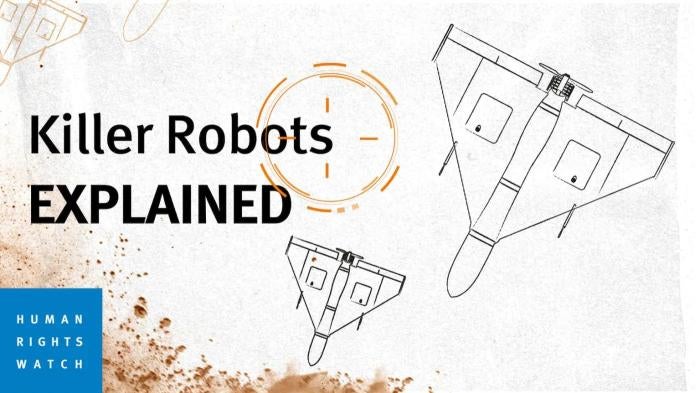(New York, December 5, 2024) – The record number of countries voting in favor of the second-ever United Nations General Assembly resolution on lethal autonomous weapons systems, or “killer robots,” highlights the urgent need to open negotiations on a new treaty to ban them, Human Rights Watch said today.
On December 2, 2024, 166 countries voted in favor of Resolution 79/L.77 on lethal autonomous weapons systems, while 3 voted no, and 15 abstained. The resolution creates a new forum under UN auspices to discuss the serious challenges and concerns raised by autonomous weapons systems and what to do about them. These systems select and apply force to targets based on sensor processing rather than human input.
“The wide and growing state support for the General Assembly resolution on autonomous weapons systems shows there’s strong appetite for tackling fundamental concerns that come with removing human control from the use of force,” said Mary Wareham, deputy crisis, conflict and arms director at Human Rights Watch. “The challenge now is for states to move from talking about this challenge to negotiating a new treaty that provides the necessary framework to prevent a future of automated killing.”
The 2024 General Assembly resolution acknowledges the “negative consequences and impact of autonomous weapon systems on global security and regional and international stability, including the risk of an emerging arms race, of exacerbating existing conflicts and humanitarian crises, miscalculations, lowering the threshold for and escalation of conflicts and proliferation, including to unauthorised recipients and non-State actors.”
The resolution also notes “the repeated calls by the [UN] Secretary-General to urgently conclude negotiations of a legally binding instrument with prohibitions and regulations for autonomous weapons systems.” The resolution does not mandate treaty negotiations because a small number of states, notably the United States, vigorously opposed doing so.
Instead, the resolution approves holding “open informal consultations” in New York during 2025 “to consider the report of the Secretary-General” and to “further the international community’s understanding of the issues involved.” UN Secretary-General António Guterres prepared the report requested by the first General Assembly resolution on the dangers of lethal autonomous weapons systems in December 2023. A total of 152 countries voted in favor of the first UN resolution on lethal autonomous weapons systems in December 2023, while 4 voted no, and 11 abstained.
The secretary-general’s report, released in August 2024, addresses the challenges and concerns raised by autonomous weapons systems “from humanitarian, legal, security, technological and ethical perspectives.” It reflects 58 submissions from more than 73 countries, and another 33 submissions from the International Committee of the Red Cross and civil society groups, including Human Rights Watch.
The UN General Assembly provides an inclusive forum in which any UN member state can contribute. The 2024 resolution specifies that the informal consultations will be open to the participation of all UN member states and observer states, international and regional organizations, the International Committee of the Red Cross, nongovernmental organizations, the scientific community, and industry.
Tackling the autonomous weapons’ challenge under the General Assembly’s auspices would allow greater consideration of concerns that have been overlooked in discussions held to date, Human Rights Watch said. They include ethical perspectives, international human rights law, proliferation, and impacts on global security and regional and international stability, notably the risk of an arms race and a lower threshold for conflict.
Some autonomous weapons systems have existed for years, but the types of targets, duration of operation, geographical scope, and environment in which such systems operate have been limited. Yet, advances in artificial intelligence and emerging technologies are spurring the development of autonomous weapons systems that operate without meaningful human control, delegating life-and-death decisions to machines. The machine, rather than the human operator, would determine where, when, or against what force is applied.
Most treaty proponents have called for prohibitions on autonomous weapons systems that, by their nature, operate without meaningful human control or systems that target people, as well as for regulations that ensure all other autonomous weapons systems cannot be used without meaningful human control.
The countries voting against the 2024 resolution were: Belarus, North Korea, and Russia. Those abstaining were: China, Estonia, Fiji, India, Iran, Israel, Latvia, Lithuania, Nicaragua, Poland, Romania, Saudi Arabia, Syria, Türkiye, and Ukraine. Many of these states have been investing heavily in military applications of artificial intelligence and related technologies to develop air, land, and sea-based autonomous weapons systems.
Austria put forward the 2024 resolution with 27 co-sponsoring states at the UN General Assembly’s First Committee on Disarmament and International Security, where it passed an initial vote on November 5, by 161 votes in favor, 3 against, and 13 abstentions.
Lethal autonomous weapons systems have been discussed in meetings of the Convention on Conventional Weapons (CCW) in Geneva since May 2014, but with no substantive outcome. The main reason for the lack of progress under the CCW is that its member countries rely on a consensus approach to decision-making, which means a single country can reject a proposal, even if every other country agrees to it. A handful of major military powers—notably India, Israel, Russia, and the United States—have exploited this process to repeatedly block proposals to negotiate a legally binding instrument.
“Explicit new international rules are needed to safeguard humanity from the threats posed by removing human control from the use of force,” Wareham said. “Governments genuinely wishing to address the concerns raised by autonomous weapons systems should participate in the New York talks next year with the goal of adopting a legally binding treaty.”
Human Rights Watch is a cofounder of Stop Killer Robots, the coalition of more than 250 nongovernmental organizations across 70 countries that is working for new international law on autonomy in weapons systems.








